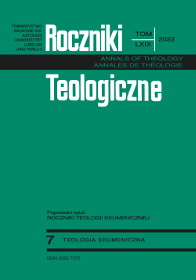Pojednanie przez pamięć i dialog: uwagi religijnopsychologiczne
Abstrakt
2021 rok cechował się, między innymi, upamiętnieniem inwazji Wehrmachtu na Rosję i następującej po tym wyniszczającej wojny. Atak ten był ściśle powiązany z zerwaniem umowy niemiecko-radzieckiej zawartej w 1939. Umowa ta była w istocie przedstawiana jako pakt o nieagresji i o przyjaźni, ale której rezultatem była okupacja Polski przez Wehrmacht i przez Armię Czerwoną oraz okupacja państw bałtyckich, niemiecka kampania wojenna na Zachodzie i wreszcie najazd na Związek Radziecki. Data ta jest więc związana z doświadczeniem traumy w licznych państwach europejskich. Powyższe uwagi pokazują, z perspektywy psychologii religii, jak te doświadczenia, dzięki konstruktywnej pamięci w dialogu, mogą przyczyniać się do etapów pojednania ze sobą, z innymi i z życiem.
Bibliografia
Antonovsky, Aaron. Health, stress, and coping. San Francisco: Jossey-Bass, 1999.
Argyle, Michael. Psychologie und Religion. Eine Einführung. New York: Routledge, 2000.
Bandura, Albert. Soziale Grundlagen des Denkens und Handelns: Eine sozial-kognitive Theorie. Englewood Cliffs: Prentice Hall, 1986.
Burke, Peter. „History as Social Memory.“ In Peter Burke. Varieties of Cultural History, 43−59. Ithaca, NY: Cornell University Press, 1997.
Dierig, Harald. Der leidvolle Weg zu einem neuen Zuhause. Münster: Aschendorff Verlag, 2013.
Frankl, Viktor E. Der unbewusste Gott: Psychotherapie und Theologie. München: DTV, 1975.
Franzenburg, Geert. „Tradition as a living treasure.“ Münster Trimda-Forum 1(2012).
Franzenburg, Geert. „Distance, remembrance, tolerance.“ PEC 47(2012): 40−49.
Franzenburg, Geert. „Displaced Values. From remembrance to resilience.“ PEC 56(2013): 59−65.
Franzenburg, Geert. „When your son asks you.“ PEC 65(2015): 66−72.
Franzenburg, Geert. „Remembering rituals and rules.“ Münster Trimda-Forum 4(2015).
Franzenburg, Geert. Erinnern verbindet. Norderstedt: BoD, 2016.
Franzenburg, Geert. „Erinnertes äußern.“ Europa−Forum Philosophie 5(2016): 85−100.
Franzenburg, Geert. „How to draw benefit from remembrance.“ Münster Trimda-Forum 5(2016).
Franzenburg, Geert. „Sustainability by education.“ DCSE 7(2016): 100−111.
Franzenburg, Geert. „Trauma as chance and challenge.“ PPC 10(2016): 13−21.
Franzenburg, Geert. Coping by remembering. Norderstedt: BoD, 2018.
Franzenburg, Geert. Stoppt Barbarossa! Norderstedt: BoD, 2020.
Glaser, Barney G. and Strauss, Anselm L. The Discovery of Grounded Theory: Strategies for Qualitative Research. Chicago, Aldine Publishing Company, 1967.
Hutton, Patrick H. „Sigmund Freud und Maurice Halbwachs. Das Problem des Gedächtnisses in der historischen Psychologie.“ The History Teacher 27(1994), 2: 145−158.
Jakobi, Franz-Joseph und Link, Roswitha (Hg.). Geschichte im Gespräch: Kriegsende 1945 und Nachkriegszeit in Münster. Münster: Agenda Verlag, 1997.
Jung, Carl Gustav. Psychologische Typen. Zürich: Rascher & Co. Verlag, 1921.
Khumalo, Itumeleng P. The evaluation of the General Psychological Well-being and the Mental Health Continuum Models in an African context. Potchefstroom: Potchefstroom University Press, 2010.
Kirkpatrick, Lee A. „Bindung und religiöse Repräsentationen und Verhalten.“ W Handbook of Attachment: Theory, research, and clinical applications, 803−822. New York: The Guilford Press, 1999.
Leavy, Patricia. „The Memory-History-Popular Culture Nexus.“ Sociological Research Online 10(2005), 1.
Olick, Jeffrey K. and Robbins, Joyce. „Social Memory Studies. From `Collective Memory' to the Historical Sociology of Mnemonic Practices.“ Annual Review of Sociology 24(1998): 105−40.
Radebold, Hartmut. „Kriegskindheiten in Deutschland — damals und heute.“ In Hartmut Radebold, Gereon Heuft, Insa Fooken (Hg.). Kindheiten im Zweiten Weltkrieg. Kriegserfahrungen und deren Folgen aus psychohistorischer Perspektive, 15−26. Weinheim: Juventa Verlag, 2006.
Ryff, Carol D. „Glück ist alles, oder ist es das? Untersuchungen zur Bedeutung des psychologischen Wohlbefindens.“ Journal of Personality and Social Psychology 57(1989), 6: 1069− 1081.
Wissing, Marie P. and Temane, Q. Michael. „Die Struktur des psychologischen Wohlbefindens im kulturellen Kontext: Auf dem Weg zu einem hierarchischen Modell der psychischen Gesundheit.“ Zeitschrift für Psychologie in Afrika 18(2008), 1: 45−56.
Copyright (c) 2022 Roczniki Teologiczne

Utwór dostępny jest na licencji Creative Commons Uznanie autorstwa – Użycie niekomercyjne – Bez utworów zależnych 4.0 Międzynarodowe.





